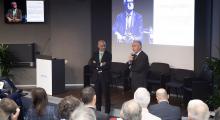
5G for Energy
Energy is technology’s lifeblood. The deployment of 5G will enable innovative solutions to facilitate the production, transmission, distribution and usage of energy, accelerating technology progress in almost all fields.
5G Energy: fuelling technology’s progress and innovation
Energy production plants require continual maintenance which is fundamental for their correct functioning and for hazard avoidance. Field service engineers are often engaged in critical operations with significant safety issues. By giving battery-dependent devices a long lifespan —10 years or more — and enabling fast, reliable communication, 5G makes the massive deployment of sensors, such as leak detectors on a pipeline, practical for utilities, allowing continuous monitoring and strongly reducing the need for human intervention thus dramatically improving safety.
Traditionally, energy systems from power generation to homes were one-directional and based on more predictable, controllable and centralised power generation. With the introduction of multiple, heterogeneous renewable energy sources, including wind, water, geothermal and solar, the production of energy has become more variable, with increased need for intelligent storing and management. Increasingly, more energy is being generated locally and connected directly to distribution networks, from solar panels, to small power plants.
Smart grid, even smarter with 5G
Smart grid combines traditional grid with communication and information control technologies characterized by efficiency, cleanliness, security, and privacy.
5G will be an important ingredient for the development of smart grid technologies, allowing the grid to better adapt to the dynamics of renewable energy and distributed generation. As renewable resources such as solar and wind power are intermittent, the grid will require integrated monitoring and control, as well as integration with substation automation, to control differing energy flows and plan for standby capacity to supplement intermittent generation. Smart Grid capabilities will make it easier to control bi-directional power flows and monitor, control, and support these distributed resources.
Digitisation of energy all the way down to smart meters
This is only the start. There is a great deal of further potential for energy companies to save costs, to operate more efficiently and to improve customer service, by connecting plant and devices to data processing facilities, and to each other, as part of the burgeoning Internet of Things (IoT). Tasks such as metering, monitoring and automation can benefit greatly from IoT connectivity.
The European Commission estimates that approximately 200 million electricity smart meters and 45 million gas meters will be rolled out by 2020, while approximately 72% of Europeans customers will have a smart meter for electricity and about 40% for gas. Smart meters will allow both suppliers and customers online access to data and analytics about energy consumption.
“We are moving towards the digitisation of gas networks, a transformation from “pipe-centric” systems to “data-centric” systems,” said Gianfranco De Feo, Executive Director of China-based gas equipment company Shanghai Fiorentini, quoted by the GSMA.
Moving from a predictive system to a real-time reporting system that leverages wireless solutions enables electric utilities to better balance supply and demand, maintain critical infrastructure, and harness technology to educate and inform consumers.
How Global5G.org for Energy can help
Global5G.org for Energy is here to help: find out more about 5G Energy use cases, navigate relevant standardisation efforts and timelines with our standard tracker, and get the pulse of the new business landscaping with our market watch.
Events
06/28/2018
Webinar - 5G: What will it change for the energy industry?
Webinar on 5G and Energy on 28 June 2018, 12:00-13:00 CEST
06/18/2018 to 06/21/2018
EuCNC2018 Workshop WS1: Vertical Industries & Services for 5G (VIS5G)
02/12/2018 to 02/13/2018
The European 5G Conference 2018
The European 5G Conference will take place on 12th & 13th February 2018 at the Steigenberger Wiltcher’s Hotel, Brussels.





